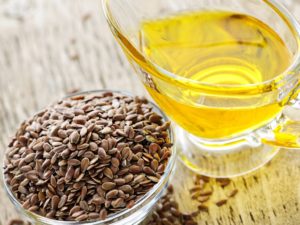
Flax oil, like many plant-based sources of omega, contains the essential fatty acid alpha-linolenic acid (ALA) which the body can convert to the omega-3 essential fatty acids eicosapentanoic acid (EPA) and docosahexaenoic acid (DHA) which are found in fish oil.
However, the conversion rate for this physiologic process is very limited – it is very low – most research puts the conversion rate around 4%. So, flax oil is not an adequate substitute for fish oil.
Recently, algae-based omega-3 supplements have been developed that solve the problem for people seeking to supplement their diet with a plant-based omega-3 product that provides a legitimate source of EPA and DHA.
Please read Vegetarianism – a slippery slope.
References:
- Barceló-Coblijn G, Murphy EJ, Othman R, Moghadasian MH, Kashour T, Friel JK. Flaxseed oil and fish-oil capsule consumption alters human red blood cell n-3 fatty acid composition: a multiple-dosing trial comparing 2 sources of n-3 fatty acid. Am J Clin Nutr. 2008 Sep;88(3):801-9.
- Burdge, G.C., and Calder, P.C. Conversion of a-linolenic acid to longer-chain polyunsaturated fatty acids in human adults. Reprod. Nutr. Dev. 45: 581-597, 2005.
- Burdge, G.C., and Wootton , S.A. Conversion of a-linolenic acid to eicosapentaenoic, docosapentaenoic and docosahexaenoic acids in young women. Brit. J. Nutr. 88: 411-420, 2002.
- Burdge, G.C., et al. Eicosapentaenoic and docosahexaenoic acids are the principle products of alpha-linolenic acid metabolism inyoung men. Brit. J. Nutr. 88: 355-363, 2002.
- Chan. J.K., et al. Effects of dietary alpha-linolenic acid and its ratio to linoleic acid on platelet and plasma fatty acids and thrombogenesis. Lipids. 28: 811-817, 1993.
- Emken, E.A., et al . Dietary linolenic acid influences desaturation and acylation of deuterium-labeled linoleic and linolenic acids in young adult males. Biochim. Biophys. Acta. 1213: 277-288, 1994.
- Food and Nutrition Board, Institute of Medicine. Dietary Reference Intakes for Energy, Carbohydrate, Fiber, Fat, Fatty Acids, Cholesterol, Protein, and Amino Acids (Macronutrients). A report of the Panel on Macronutrients, Subcommittess on Upper Reference Levels of Nutrients and Interpretation and Uses of Dietary Reference Intakes, and the Standing Committee on the Scientific Evaluation of Dietary Reference Intakes. National Academy Press, Washington , DC , 2002.
- Francois, C.A., et al . Supplementing lactating women with flaxseed oil does not increase docosahexaenoic acid in their milk. AJCN. 77: 226-233, 2003.
- Gerster, H. Can adults adequately convert a-linolenic acid (18:3n-3) to eicosapentaenoic acid (20:5n-3) and docosahexaenoic acid (22:6n-3)? Int. J. Vit. Nutr. Res. 68: 159-173, 1998.
- Hussein, N., et al. Long-chain conversion of [13C]linoleic acid and a-linolenic acid in response to marked changes in their dietary intake in men. J. Lipid. Res. 46: 269-280, 2005.
- Lamptey, M.S., and Walker, B. L. A possible essential role for dietary linolenic acid in the development of the young rat. J. Nutr. 106(1): 86-93, 1976.
- Lane K, Derbyshire E, Li W, Brennan C. Bioavailability and potential uses of vegetarian sources of omega-3 fatty acids: a review of the literature. Crit Rev Food Sci Nutr. 2014;54(5): 572-9.
- Pawlosky, R. J., et al . Physiological compartmental analysis of alpha-linolenic acid metabolism in adult humans. J. Lipid Res. 42(8):1257-1265, 2001.
- Doughman SD1, Krupanidhi S, Sanjeevi CB. Omega-3 fatty acids for nutrition and medicine: considering microalgae oil as a vegetarian source of EPA and DHA. Curr Diabetes Rev. 2007 Aug;3(3):198-203.




